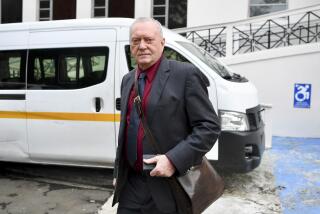Judge Declares Mistrial in United Community Bank Fraud Case : Trial: Jury deadlocks on charges accusing two former Thousand Oaks partners of defrauding regulators. Retrial is scheduled.
- Share via
A federal jury Tuesday acquitted former Thousand Oaks banker Phillip L. Chase of one count of filing false documents, but triggered a mistrial in a government bank fraud case by deadlocking on eight other fraud counts against him and former partner Olen B. Phillips.
The mistrial set the stage for a retrial set March 1 of both Chase and Phillips on the eight remaining charges accusing them of defrauding bank regulators in a bid to save their foundering United Community Bank in 1989.
All 12 jurors found Chase, 51, not guilty of filing a false application to Community Bank in Pasadena when he sought a $750,000 loan to help support his own, unrelated United Community Bank. The statement had understated the Thousand Oaks bank’s debts, according to the indictment.
But the jurors declared themselves deadlocked over the remaining eight counts of the federal indictment against Chase and Phillips, 53, of Oak View.
At the request of Richard Marmaro, Chase’s attorney, and Steven Powell, Phillips’ attorney, U. S. District Judge William Keller declared a mistrial and ordered a new trial for the defendants March 1.
For 13 days, the jury had deliberated, squabbled and even came close to blows, jurors said Tuesday in Los Angeles.
Deliberations were stressful and hard, said one woman juror from Los Angeles County, who declined to give her name. “It’s easier to go to work than to do this,” said the woman, who said she voted to convict Chase and Phillips.
Jurors once wavered toward acquittal on an 8-4 vote, jury foreman Len Booth said. But most of the time, they remained about evenly divided, he said--half finding Chase and Phillips were guilty, and half believing them innocent.
“It was terrible, bad--a real difference of opinions,” Booth said Tuesday. One juror “got in my face” and yelled during an argument, he said.
“I finally got fed up with it after five days and sent the judge a note saying that it is our sincere opinion we’d never reach a verdict in this case.”
Keller sent the jury back for more deliberations, urging them to do their best to reach a verdict, but to no avail, Booth said. On Tuesday, Booth said he sent the same message.
“All I know is nothing changed in 13 days in the opinions of the guilties and the not-guilties,” said Booth, 56, a retired aerospace quality control expert from San Pedro.
Booth said he voted to acquit Chase and Phillips because there was no proof that they intended to defraud banking regulators.
Chase had testified that he did not know that he was breaking banking regulations when he and Phillips tried to save the bank by lending $300,000 to customers and borrowing the same amount back from them to buy stock. It is illegal for bank officers to shore up an institution with funds that they borrow from it.
And while some jurors found inconsistencies between some of Chase’s testimony and his statements to banking regulators, they did believe that he did not intend to break the law, Booth said.
During jury instructions, “the judge really shoved it down our throats that violation of banking rules is not a crime,” Booth said. “These guys were charged with criminal conspiracy. I did not believe there was sufficient evidence to prove beyond a reasonable doubt there was intent to defraud at the time the transactions occurred.”
Booth added: “Phillips calls Chase and says, ‘I’ve got a deal here,’ and Chase says, ‘OK.’ Are they conspiring or are they banking?”
Juror Alan Furbershaw, who voted to convict Chase and Phillips, agreed that the most hotly contested issues were intent and conspiracy.
“Each side had pretty reasonable explanations, in their own minds,” said Furbershaw, 39, a Pacific Bell service technician from Simi Valley.
Those favoring acquittal “seemed to think it was just a bunch of trumped-up charges, and that the government was out to get them because some (banking) agency had overlooked something,” he said. Those for conviction saw “a pattern of deception” by Chase and Phillips, he said.
Jurors argued heatedly, and one even yelled and cursed, he said.
“We had one that came very close to almost an actual exchange of fists, and another not quite” so bad, Furbershaw said.
“I saw it as two moral issues,” he added. “Several people on the jury felt that lying and falsifying was OK under certain circumstances. That was a major, major issue.”
While about half the jury believed that Chase and Phillips were guilty as charged, the evidence against Phillips appeared thin, Furbershaw said, and Booth agreed.
“We had some testimony (about Phillips) I didn’t believe, and statements he made to the state banking department that I didn’t believe, but there was very little evidence linking Mr. Phillips to this case,” Furbershaw said.
In an unrelated case, Phillips was convicted in a 1992 state court trial of one charge from a multi-count state indictment accusing him and Charles J. Francoeur of bilking 21 investors out of more than $3 million in complicated land deals. Phillips served a 60-day jail term in that case.
More to Read
Sign up for Essential California
The most important California stories and recommendations in your inbox every morning.
You may occasionally receive promotional content from the Los Angeles Times.













